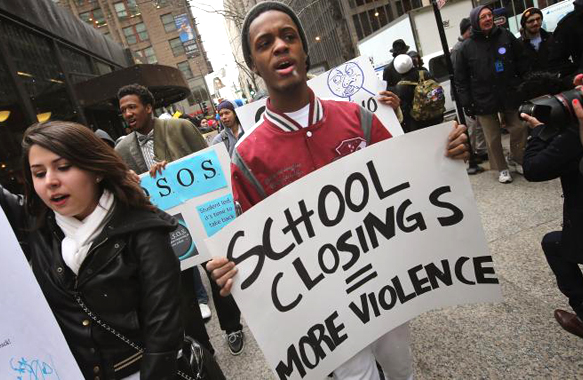The Origins of “Privilege”
Photograph courtesy Peggy McIntosh. By Joshua Rothman | Originally Published at The New Yorker. May 13, 2014 The idea of “privilege”—that some people benefit from unearned, and largely unacknowledged, advantages, even when those advantages aren’t discriminatory —has a pretty long history. In the nineteen-thirties, W. E. B. […]
School Closures: A New Version of Separate and Unequal
Photograph; Students walk through the Loop March 25, 2013, to protest plan to close 50 Chicago elementary schools. | Scott Olson/Getty Images
By Jitu Brown And Debra Jones| Originally Published at The Root. May 18, 2014
Saturday marked the 60th anniversary of the Supreme Court’s Brown v. Board of Education decision, which struck down the “separate but equal” doctrine in public schools. Long after this landmark civil rights victory was won in the courts, however, communities of color have continued the struggle to realize an equal education for their children. From fighting back against attempts to evade desegregation to challenging efforts to keep youths of color confined to underresourced and overcrowded schools, students and parents have been doing the work of building excellent neighborhood schools for all communities for decades.
Six decades after Brown, a new “separate and unequal” doctrine is producing the same outcomes for African-American children with a different playbook: school closures. Nationwide, under the guise of “education reform,” corporate profiteers and politicians have targeted public schools that serve communities of color. Our schools are being closed, with students shuffled around and re-enrolled in different schools away from our neighborhoods. Our schools are being turned over to private companies or swapped out for charters.
In the past school year alone, Philadelphia closed 24 public schools and relocated or merged five more. Black students, who are only 58 percent of all Philadelphia students, made up 81 percent of the students affected by the closures. In Chicago, 50 schools were closed. Black students account for 43 percent of all Chicago students but 87 percent of the students affected by the closures.
Not only have top-down, punitive policies such as school closings, turnarounds and charter expansions failed to improve education outcomes for our children, but they have actually done harm. These practices are destabilizing well-performing neighborhood schools when they become overcrowded empathyeducates – School Closures: A New Version of Separate and Unequal:

